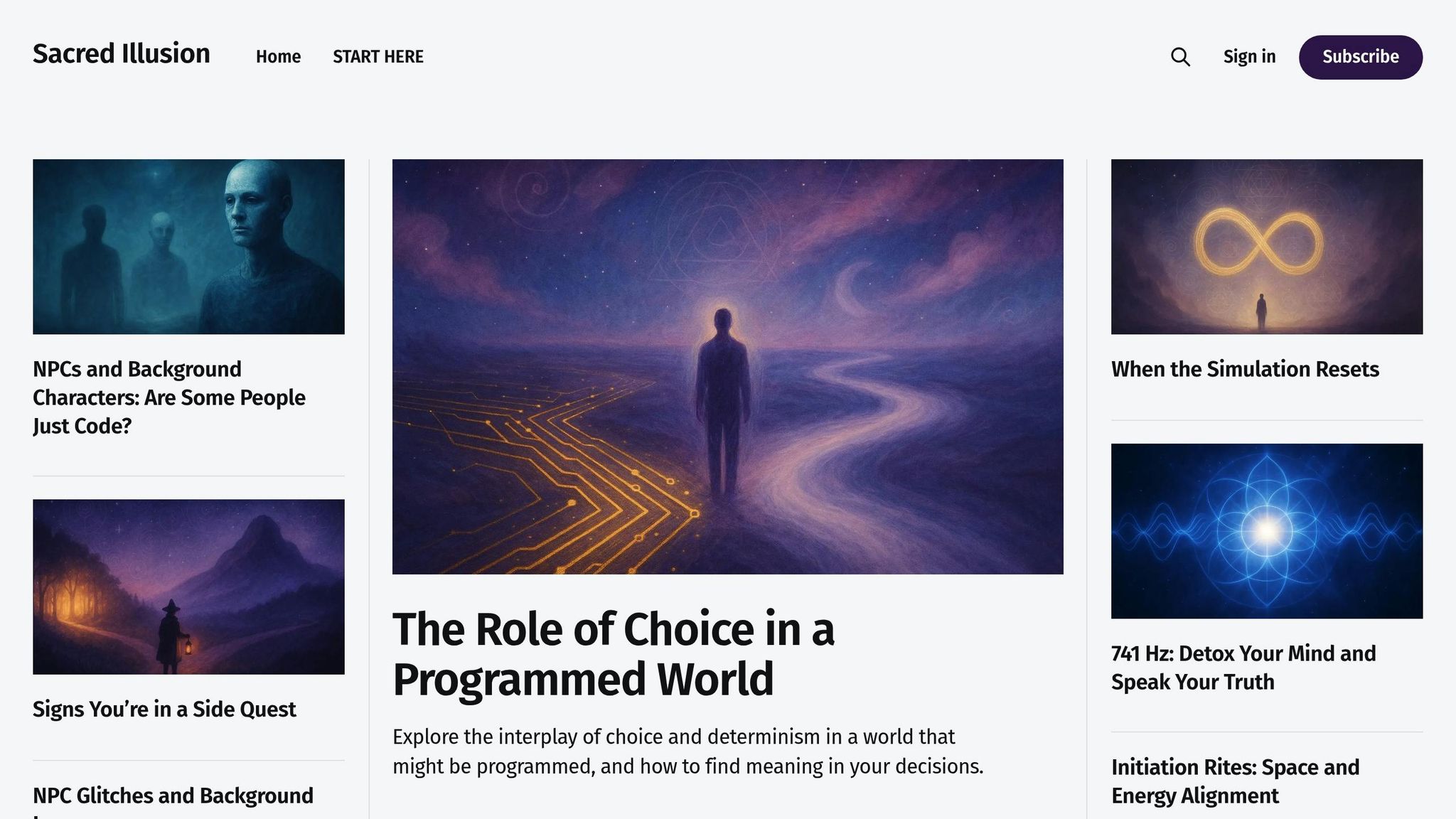What Happens When You Opt Out
Opting out of societal norms can lead to a more intentional, meaningful life focused on authenticity, peace, and self-awareness.

Tired of the endless cycle of work, spend, repeat? Opting out offers a way to reclaim your life. It’s about stepping away from societal norms that don’t align with your values and focusing on what truly matters. Here’s a quick breakdown:
- What is it? Opting out means rejecting systems like consumerism or constant digital connectivity to live a simpler, more intentional life.
- Why do it? Many feel overwhelmed by materialism or societal pressures and crave clarity, peace, and deeper meaning.
- How to start:
- Simplify your life through minimalism (e.g., declutter or try Project 333).
- Take digital detoxes to reduce screen time and mental noise.
- Explore spiritual practices like meditation or journaling to reconnect with yourself.
- Challenges: You may face isolation, financial uncertainty, or misunderstanding from others.
Opting out isn’t about running away - it’s about redefining your life on your own terms. Ready to take the first step? Let’s dive in.
Why I Chose To Live a “Boring” Life
How to Opt Out: Practical Methods
Recognizing the need to opt out is the first step. Instead of grand gestures, focus on simple, intentional actions to shift away from external distractions and toward a more centered, meaningful life.
Minimalism and Simple Living
If you’re ready to opt out, start by simplifying your surroundings. Minimalism isn’t about stripping your life down to the bare minimum - it’s about focusing on what truly adds value to your life. It’s less about things and more about creating space for experiences, relationships, and personal growth.
Take Joshua Fields Millburn, for example. He drastically reduced his possessions - letting go of about 90% of them over eight months - and found freedom, happiness, and a sense of calm.
"Minimalism is the thing that gets us past the things so we can make room for life's most important things - which actually aren't things at all." - Joshua Fields Millburn
What’s great about minimalism is that it’s personal. You get to decide what it looks like for you. Start by asking yourself why you want to simplify. Are you craving more time? Less stress? A clearer mind? Knowing your “why” gives purpose to the process.
Begin small. Declutter a single drawer, a shelf, or one corner of a room. Leave some spaces intentionally empty to encourage reflection. You can even try challenges like Project 333, where you limit your wardrobe to 33 items for three months, or the Mins Game, where you get rid of one item on day one, two items on day two, and so on for a month.
"Declutter mindfully and slowly so the change is not so overwhelming." - Seth Barham
Minimalism isn’t just about physical stuff. It’s also about simplifying your commitments and relationships. Let go of obligations that don’t align with your values, and surround yourself with people who uplift rather than drain you. Applying practical rules like the 80/20 principle - where 20% of your belongings or efforts bring 80% of the value - can help you focus on what matters most.
Remember, the goal isn’t to prove how little you can live with. As one minimalist wisely said: "We don't remove clutter, reduce stress, and reject busyness to have a simple life. We do it to have a life."
Digital Detox and Technology Breaks
Cutting down on digital clutter is just as important as simplifying your physical space. Many Americans spend over six hours a day on devices, and it’s no surprise that about 43% admit to constantly checking emails, messages, and social media. A digital detox can help restore balance and reduce the mental noise caused by constant connectivity.
"A digital detox can be a powerful act of self-care that restores balance, reduces mental clutter, and supports long-term emotional health. By taking time away from screens, we make room for more presence, deeper connections, and a clearer mind."
The benefits of unplugging go beyond feeling less overwhelmed. It can boost your mood, improve focus, enhance sleep quality, and deepen relationships. Without the constant pings and notifications, your mind has a chance to reset.
Start small. Establish screen-free times, such as during meals or an hour before bedtime. Turn off unnecessary notifications, and use features like "Do Not Disturb" or Focus modes to limit distractions. Create screen-free zones in your home - like the bedroom or dining table. You might even log out of social media or temporarily remove addictive apps from your home screen.
"The more energy we direct toward our devices, the less energy we're directing toward whoever is in the room with us." - Elisabeth LaMotte, licensed clinical social worker
For a deeper detox, try leaving your phone at home during short outings or keeping it in another room. Turning your screen to grayscale can also make it less tempting. And don’t forget the 20-20-20 rule: every 20 minutes, look at something 20 feet away for 20 seconds to reduce eye strain and mental fatigue.
Replace screen time with activities that genuinely bring you joy - like reading, cooking, walking, or taking up a creative hobby. These offline pursuits can help fill the gap that stepping away from screens might leave at first.
Spiritual Practices and Solitude
Once you’ve reduced external distractions, the next step is to turn inward. This is where you start asking deeper questions: Who are you beyond your possessions? What truly brings you peace?
Silent meditation is one way to reconnect with your inner self. It helps quiet the mind and allows you to experience a deeper sense of awareness.
"The most effective way to align to your source is with a silent meditation that permits the mind's activity to go beyond its limitations and experience your core consciousness. That is your source. Your mind with its thoughts and desires becomes aligned with it the more you experience that silent state of awareness." – Deepak Chopra
Spiritual alignment isn’t just about finding peace - it’s about integrating that peace into your daily actions. This means focusing on activities that resonate with your well-being, rather than chasing goals that don’t feel authentic to you.
"Let your alignment (with Well-Being) be first and foremost, and let everything else be secondary. Not only will you have an eternally joyous journey, but everything you have ever imagined will flow effortlessly into your experience." – Esther Hicks
Being present is key. When you focus on the here and now, you naturally let go of worries about the future and regrets about the past.
"When the basis for your actions is inner alignment with the present moment, your actions become empowered by the intelligence of life itself." – Eckhart Tolle
In addition to meditation, explore practices like chanting, prayer, or writing in a journal. Spend time in nature without distractions. These activities can help you process emotions and reconnect with what feels real.
Sometimes, deeper inner work might be necessary. Therapy or working with a spiritual coach can help address patterns that keep you stuck. The goal isn’t to withdraw from the world but to build a foundation of inner stability. When you’re grounded in your own truth, you can engage with life on your own terms, rather than being swept along by external pressures.
The Pros and Cons of Opting Out
Choosing to opt out of mainstream systems or expectations comes with a mix of rewards and challenges. While it can bring a sense of peace and authenticity, it also introduces hurdles like isolation and uncertainty.
Benefits of Opting Out
One of the most immediate rewards of opting out is the sense of peace it brings. By stepping away from the constant noise and distractions of daily life, you create space for a deeper awareness that often gets buried under the demands of modern living.
Research shows a strong connection between spirituality and mental well-being, with practices like meditation helping to balance brain functions and reduce stress. Meditation and prayer can even lead to changes in the prefrontal cortex, the part of the brain responsible for emotional regulation and decision-making. This means that beyond temporary stress relief, you're actually rewiring your brain to handle challenges with greater resilience.
Opting out also clears the path for a more authentic life. Without the weight of external expectations, you can focus on what truly matters to you. Spirituality often serves as a guide, helping individuals find a deeper sense of meaning and purpose, which can boost self-esteem and overall well-being.
This authenticity can improve relationships as well. When you're more grounded in your true self, your connections with others become more meaningful. Participating in spiritual communities can further enhance this by providing emotional support and a sense of belonging.
Difficulties of Opting Out
However, the benefits of opting out come with their own set of challenges. For one, stepping away from conventional systems can lead to feelings of isolation. Friends, family, or colleagues may not fully understand your choices, leaving you feeling disconnected.
Financial uncertainty is another significant hurdle. Opting for a less traditional lifestyle - whether that means cutting back on work hours, leaving a steady job, or making other big changes - often requires financial sacrifices. This can be particularly stressful if you have dependents or ongoing financial responsibilities.
There’s also the stigma surrounding mental health and alternative lifestyles. Others might misinterpret your decision to opt out, labeling it as laziness or weakness. This misunderstanding can lead to feelings of shame or fear of discrimination.
Uncertainty is another major challenge. Letting go of conventional systems and expectations means stepping into unknown territory. This can create anxiety, especially during moments when the benefits of your choice feel unclear or distant.
Lastly, cultural and familial expectations can create tension. Long-held traditions or family norms may clash with your desire for a simpler, more authentic life, leading to internal struggles and external conflicts.
Weighing the Trade-offs
Navigating these trade-offs requires careful consideration. As economist Thomas Sowell wisely said:
"There are no solutions, there are only trade-offs; you try to get the best trade-off you can get, that's all you can hope for."
| Advantages of Opting Out | Disadvantages of Opting Out |
|---|---|
| Greater mental clarity and peace | Risk of social isolation |
| Improved emotional resilience | Financial uncertainty and stress |
| Alignment with personal values | Stigma and misunderstanding from others |
| More meaningful relationships | Loss of traditional support systems |
| Reduced anxiety and better mental health | Anxiety about an uncertain future |
| Stronger sense of purpose and meaning | Potential cultural or family conflicts |
| Deeper spiritual connection | Initial discomfort during transition |
| Freedom from societal pressures |
Deciding to opt out is deeply personal and requires honest self-reflection. Assess your support systems, financial stability, and emotional resilience. Remember, this doesn’t have to be an all-or-nothing decision. You can start small - make gradual changes, test the waters, and adapt as you learn more about your needs. Opting out is ultimately about reshaping your life in a way that aligns with your values, one deliberate step at a time.
The Deeper Meaning of Opting Out
Taking a closer look at the concept of opting out raises profound questions: How real is the reality we live in? Choosing to step away from societal norms doesn’t just alter your daily life - it challenges the very foundation of how we perceive the world and invites us to explore its deeper truths.
Waking Up from the Illusion
Opting out can be seen as a kind of awakening - a gradual realization that the world we experience might not be what it seems. This isn’t just abstract philosophy. Thinkers like Nick Bostrom have theorized that future civilizations could create advanced simulations capable of replicating the lives of their ancestors in extraordinary detail. Similarly, David Chalmers has suggested the possibility of a “programmer” in a higher dimension, responsible for crafting a hyper-realistic simulation. If this is true, living in such a simulation would be like existing in a massive, digital version of The Sims, where we are the characters.
By stepping back from conventional systems, you begin to see the world differently - almost as if you’re peeking behind the curtain. One thinker describes this experience perfectly:
"Awakening is the 'glitch in the Matrix' moment - when you catch glimpses of the underlying code. It's when you realize that consciousness is primary, and the physical world is secondary - a projection that reflects the collective and individual states of awareness." - BrilliantScholar1251
This awakening isn’t a one-time event; it’s an ongoing process of remembering who you truly are. Every time you choose simplicity over chaos or quiet reflection over constant noise, you’re, in a sense, “hacking the simulation.” It’s about recognizing the patterns, limitations, and programming that shape our perception of reality and shifting your awareness to something deeper.
Interestingly, these modern perspectives align closely with ancient teachings, as we’ll see next.
Ancient Wisdom and Modern Practice
Long before simulation theory entered our conversations, ancient spiritual traditions offered insights that resonate with today’s search for understanding. Take Hinduism, for instance, which speaks of Maya - a veil of illusion that distorts our understanding of reality.
"To say that the universe is an illusion (māyā) is not to say that it is unreal; it is to say, instead, that it is not what it seems to be, that it is something constantly being made. Māyā not only deceives people about the things they think they know; more basically, it limits their knowledge." - Wendy Doniger
The concept of Maya mirrors ideas found in simulation theory, suggesting that what we perceive as real might be far from the full picture. It’s a notion echoed in Plato’s Allegory of the Cave, where shadows on a wall represent a distorted version of reality.
The Bhagavad Gita provides practical advice for navigating this illusion:
"This divine illusion (Maya) of mine, caused by the gunas (modes of nature), is difficult to overcome. But those who surrender unto me transcend this illusion." - The Bhagavad Gita (7.14)
Ancient teachings also offer tools for stepping outside the illusions of everyday life. Practices like detachment (Vairagya) don’t involve rejecting life but rather freeing yourself from emotional entanglements and dependencies. Acts of selfless service, introspection, meditation, and prayer help align the mind with deeper truths. Asking the question, “Who am I?” can guide you toward understanding your existence beyond the physical and mental layers.
"The world has not trapped you. You have trapped yourself with attachments." - Swami Mukundananda
Fighting Back or Creating Something New?
This leads to an important question: Is opting out a form of resistance, or is it about creating something meaningful within the system? For some, opting out means rejecting inauthentic systems and refusing to conform to societal expectations.
In fact, some argue that religion itself may stem from glimpses into a reality that goes beyond the physical. Eastern philosophies, for example, have long taught that the material world is an illusion. Buddhism, in particular, emphasizes that consciousness is the only true reality.
"The Lord dwells in the hearts of all beings, O Arjuna, causing all beings, by His illusive power, to revolve as if mounted on a machine!" - Swami Sivananda's translation of the Bhagavad Gita 18:61
Opting out doesn’t have to mean fighting against the system. Instead, it can be about learning to navigate it more skillfully - like a lucid dreamer who realizes they’re dreaming and begins to influence the dream itself.
"Maya is often translated as 'illusion' or 'magic,' but its philosophical meaning is deeper. It refers to the powerful force that creates the cosmic illusion; the illusion that the material world, as we perceive it through our senses, is the only reality." - CunningStunts1999
Rather than trying to destroy Maya, the goal is to understand and transcend it. By looking past the illusion, you reclaim the ability to shape your experience. In a world that often feels predetermined, this act of choosing becomes a powerful statement - a celebration of the journey through illusion and the discovery of what lies beyond.
Conclusion: Your Path to Opting Out
Opting out is about choosing to wake up to life with a fresh perspective. This journey reveals how stepping away from conventional systems can lead to profound self-awareness, helping you uncover everyday illusions and connect with deeper truths.
Main Points to Remember
The process of opting out starts with intentionality - making a conscious decision to focus on what genuinely matters instead of being swept up by external demands. As James Redfield wisely states:
"Where attention goes, energy flows. Where intention goes, energy flows".
This quote reminds us that true power comes from choosing where to place our attention, not from trying to control every aspect of life.
Practices like minimalism, digital detoxing, and spiritual exploration create space for deeper self-awareness. The real shift happens when you understand the meaning behind these practices - recognizing that consciousness takes precedence over the physical world. This perspective helps you look past surface-level distractions and illusions.
Intentional choices not only shift your energy but also bring clarity. Self-reflection and spiritual alignment are key to maintaining this transformation. Instead of battling external systems, you learn to engage with them more skillfully. Even if life feels like a simulated reality, your conscious decisions shape your experience.
Meditation and mindfulness play a crucial role in this journey. As Gretev1 explains:
"Meditation strengthens the real and totally ends the false. It goes to the root of all suffering".
These practices help you detach from over-identifying with your mind and body, paving the way for heightened awareness and inner peace.
How Sacred Illusion Can Help Your Journey

Sacred Illusion offers tools and resources to support your transformation. For instance, the Mirror of Illusion™ ritual guide provides actionable steps to shed false identities and reconnect with your authentic self. When you're stuck in unhelpful patterns, Sacred Illusion reminds you that your soul is striving to break free from illusions.
The philosophy behind Sacred Illusion emphasizes that clarity comes not from escaping illusions but from seeing them for what they are. Through Opthē, you can explore reflections and insights that reveal life's hidden layers while staying grounded. This resource encourages you to use metaphors as tools for conscious meaning-making, inviting you to actively engage in your personal growth.
Ultimately, opting out is about making intentional choices and cultivating awareness. You don't need to abandon everything at once or isolate yourself from the world. Instead, focus on the feelings you want to nurture, trust your intuition, and allow the process to unfold naturally. Set clear, present-focused intentions, keep them visible, and practice mindfulness daily.
Your journey is uniquely yours, but you don't have to navigate it alone. With Sacred Illusion, you'll find the tools, insights, and community to help you move forward with clarity and confidence.
FAQs
How can I deal with feeling isolated or misunderstood after choosing to opt out?
Feeling disconnected or misunderstood after stepping away from the mainstream can be tough, but there are ways to handle it. One of the best things you can do is find a community of people who share your values and outlook. This might mean joining local meetups, participating in online forums, or attending events where others understand and support your decision.
It's also important to maintain strong connections with the people you care about. Keep the lines of communication open - talk about your experiences and share your perspective. When it feels right, explain your reasons for stepping away and how it’s brought positive changes to your life. Building understanding and respect takes time, but these conversations can help deepen your relationships while allowing you to stay true to your choices.
How can I manage financial uncertainty while simplifying my lifestyle?
To manage financial uncertainty while simplifying your lifestyle, start with an emergency fund that can cover 3–6 months of essential expenses. This financial cushion offers reassurance during unexpected situations.
Take a closer look at your budget regularly, focusing on the essentials and cutting out unnecessary spending. Tackling high-interest debt should be a priority, as it can significantly ease financial pressure. Automating your savings is another smart move - it keeps you on track without the hassle of remembering to set money aside. Embracing minimalism by owning fewer things and spending thoughtfully can free up both resources and mental space.
These practical steps can help you build a more stable financial foundation while enjoying the rewards of a simpler, less stressful life.
How can I stay motivated and focused on my goals when stepping away from distractions feels tough?
When stepping away feels like too much to handle, staying motivated often starts with breaking your goals into smaller, manageable steps. Tackling bite-sized tasks makes progress feel within reach and less overwhelming. Setting clear milestones along the way can also keep you on track and provide a sense of achievement as you move forward.
Creating daily routines and celebrating even the smallest victories can help maintain your momentum. Simple rewards for progress can strengthen your commitment and keep you motivated. And don’t overlook the importance of self-care - taking time to rest and recharge equips you to face challenges with a clearer mind and greater resilience. Progress doesn’t have to be flawless; it just needs to keep moving.




